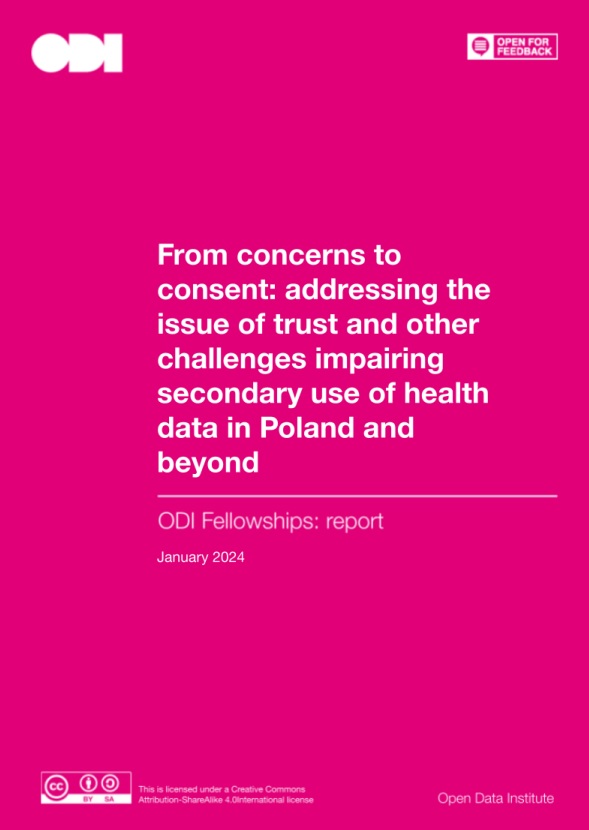The European Union is gearing up for the establishment of a European Health Data Space. In response to apprehensions surrounding this initiative, an Instrat expert, Blanka Wawrzyniak, conducted research on the secondary use of health data. The researcher underscores the pivotal role of trust in the institutions responsible for collecting the data and the mechanisms governing its sharing. It would seem that the COVID-19 pandemic and the controversial idea of introducing a so-called ‘pregnancy registry’ will undermine Poles’ enthusiasm for sharing medical data. However, the outcome of this matter is not predetermined.
European health data space
The proposed regulation by the European Commission for a European Health Data Space aims to enhance individuals’ access to and control over their electronic personal health data, facilitating the reuse of specific data for research and innovation purposes. Currently, access to health data across borders differs among EU countries. The new rules seek to enable scenarios such as a Polish tourist filling a prescription at an Italian pharmacy and a doctor accessing the health information of a French patient undergoing treatment in Poland.
The pandemic highlighted the need for knowledge about the health status of the population
The COVID-19 pandemic has underscored the immense value of health data as a crucial resource for patients, doctors, researchers, and medical institutions. The imperative to mitigate the severe consequences of a global pandemic has emphasised the necessity of maintaining a dynamic flow of information on the health status of the population across various institutions at local, state, and international levels. It is upon this data that numerous scientists based their vaccine development efforts, and policymakers relied on it to make strategic decisions.
Controversy in Poland
However, the widespread use of health data is controversial. In Poland this controversy was exemplified by the proposal to establish a ‘pregnancy register,’ introduced during the tenure of the Law and Justice party. The regulation sought to expand the data collected for the Medical Information System, encompassing various patient information, including details related to pregnancies and contraception. Despite the proposal having a legitimate basis, driven by the need to align Polish law with European regulations, the local context and societal unrest surrounding changes in abortion laws led citizens to perceive the regulation not as an effort to enhance information flow and improve medical services but as an attempt to exert control over Polish women.
“Violations of EU law and human rights by the previous ruling party, coupled with incidents like data leaks or instances of cyber surveillance, may have adversely impacted Poles’ attitudes towards data sharing. This was evident in 2020 when the public opinion opposed new regulation proposed by the Ministry of Health, showcasing citizens’ reluctance to share data with state institutions,” assesses the report’s author, Blanka Wawrzyniak.
Trust in institutions is key
Central to the issue of the secondary use of patient health information is trust in the institutions responsible for collecting and managing the data. In the context of Poland, attitudes toward data sharing have been notably ambivalent in recent years. “Following the pandemic, there has been an increased awareness of how health data could be utilised for the benefit of society. Some surveys even indicate that the majority of Poles are willing to share their data, provided it contributes to the common good, for example, in the fight against civilization diseases. However, within the last six months alone, there have been several incidents involving the leakage of patient data from laboratories or the unauthorised disclosure of sensitive health information by public administration employees. Such occurrences have significant consequences and may contribute to a growing scepticism about making data available for reuse. This, in turn, could impede the development of initiatives like the European Health Data Space, as effective functioning would be hindered if citizens lack trust in it,” explains Blanka Wawrzyniak.
Recommendations
Despite the sensitive nature of health information and the controversies surrounding (unauthorised) access to it, the decision to introduce solutions enabling large-scale secondary use of data in the health sector appears justified and reasonable. Public health institutions not only enjoy the highest level of trust (compared to other state bodies) but citizens have also become more aware of the benefits of sharing health data. This presents an opportune moment to lay the groundwork for initiatives like the European Health Data Space and establish conditions for data reuse, thereby further contributing to the improvement of healthcare quality, the development of life-saving innovations, enhanced planning of public policies, and more effective strategic decision-making in the field of public health.
However, to ensure the aforementioned conditions for the re-use of health data, it is necessary to:
- Build trust through design and democratic governance of the data-sharing models;
- Raise citizens’ awareness;
- Incentivise citizens;
- Implement a consistent and clear legal framework for secondary health data sharing;
- Simplify consent mechanisms;
- Support interoperability through standardisation;
- Provide technical support to medical personnel.
This report has been published within the ODI Fellowship pogram. Blanka Wawrzyniak studied the secondary use of health data, with a primary focus on the importance of citizen engagement in the health data-sharing process. The research also explored additional pivotal factors influencing health data reuse such as regulatory barriers, lack of proper infrastructure and technical standards, lack of awareness of patients, analysing them within the Polish context alongside considering the broader European perspective.


